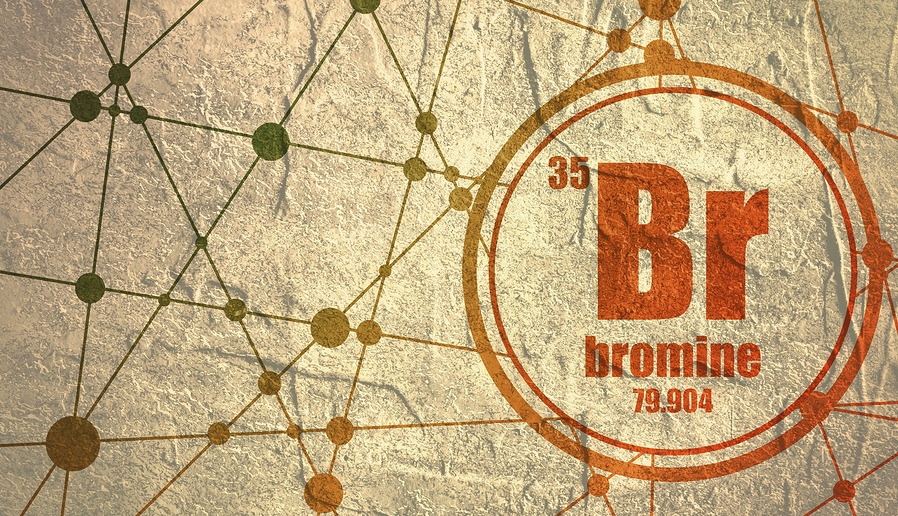Know Your Remedies: Bromium (Brom.)
 Common Name: Bromine.
Common Name: Bromine.
General Information
Bromium (Brom.) is remedy for health problems that affect the larynx and respiratory tract, and to a lesser degree, the glands. Complaints, especially of the glands, are more likely to be worse on the left side of the body. Dust and smoke allergies are common, and symptoms frequently improve on or by the sea. The person needing Bromium is affected by warm weather, overheats easily, and is often fair-skinned with blonde hair.
Mental-emotional
- Frequently feel as if someone is behind them.
Ear, Nose, and Throat
- Colds that start in the larynx and move upwards to the nose and sinuses.
- Hoarseness and aphonia (loss of voice).
Respiratory
- Dry, spasmodic, croupy cough.
- Hoarse, tickling cough – especially when overheated.
- Colds that come on after perspiration from overheating.
- Summer colds and complaints.
- Asthma relieved by the seaside.
- Asthma in sailors when they leave the sea.
Glands and Lymphatics
- Swelling of glands with stony-hardness.
- Glandular swelling worse on the left side.
- Swelling of the parotid or submaxillary gland.
- Swelling or nodules of the thyroid gland.
Where Do I Find It?
Bromium (Brom..) is available from our online store as a single remedy in either pill or liquid form.
Home Treatment Guidelines
Acute, Self-Limiting Conditions
Conditions like colds or minor injuries, which are short-term and typically improve on their own, can be managed at home with homeopathy. However, in emergencies or if symptoms worsen, contact your healthcare provider.
Chronic Conditions
These home treatment instructions do not apply for ongoing issues, whether mentioned above or not, like persistent allergies or chronic pain. You should consult a qualified homeopath for a personalized treatment plan to achieve the best results with homeopathy for chronic conditions.
How to Take the Remedy for Acute Conditions
- Take one pill or five drops of the remedy. The frequency depends on symptom severity. As examples:
- For life-threatening symptoms, take every 1 minute and seek emergency help immediately.
- For mild symptoms, take every 4 hours.
- Stop taking the remedy once you feel better. Resume if symptoms return.
- If no improvement after four doses, choose a different remedy or consult a professional homeopath.
- For more details on dosing, refer to: How Often to Dose with a 30C Homeopathic remedy.
- For information on the different potencies, read: Guidelines on which potency to use
Additional Notes From Past Masters
Homeopathy is a 200-year-old system of medicine. Early homeopaths recorded detailed notes on how remedies worked, including initial tests, remedy relationships, and their experiences. These writings were shared to improve homeopathic practice and now offer fascinating insights into past uses of homeopathy. Here’s an example, edited and modernised for clarity, from Leaders In Homoeopathic Therapeutics (1898) by E. B. NASH M.D.:
Leaders In Homoeopathic Therapeutics by E. B. NASH M.D.
Bromium (Brom.)
An element proven and arranged by Hering and an important remedy in laryngeal affections.
Also in scrofulous and tubercular affections of the glands.
It is well known to act best on persons with light blue eyes, flaxen hair, light eye-brows, fair, delicate skins, red cheeked scrofulous girls.
It will be remembered how almost exactly opposite, so far as temperament is concerned, is Iodine, which is also one of our chief anti-scrofulous remedies.
In glandular affections, three remedies that are not as often thought of as they perhaps should be, are Carbo animalis, Conium and Bromine; in all three the glands are stony hard with a cancerous tendency.
In Bromine the pains are not characteristic, but with Conium and Carbo animalis they are lancinating, cutting or burning, more like cancer pains.
In diphtheria, where it has done some wonderful work, the membrane first forms in the bronchi, trachea or larynx, running upward, just the opposite of Lycopodium, which often forms first in the nose and runs downward.
In membranous croup, there is great rattling of mucus like Hepar, but no expectoration. There seems to be great danger of suffocation from accumulation of mucus in larynx (in bronchi, Ant. tart.).
Sensation of cobweb in face. (Bar., Graph. and Borax).
Fan-like motion of alæ nasi (Ant. t. Lycop.).
Hypertrophy of heart from gymnastics (Caust.).
Membranous dysmenorrhœa (Lac can.).




